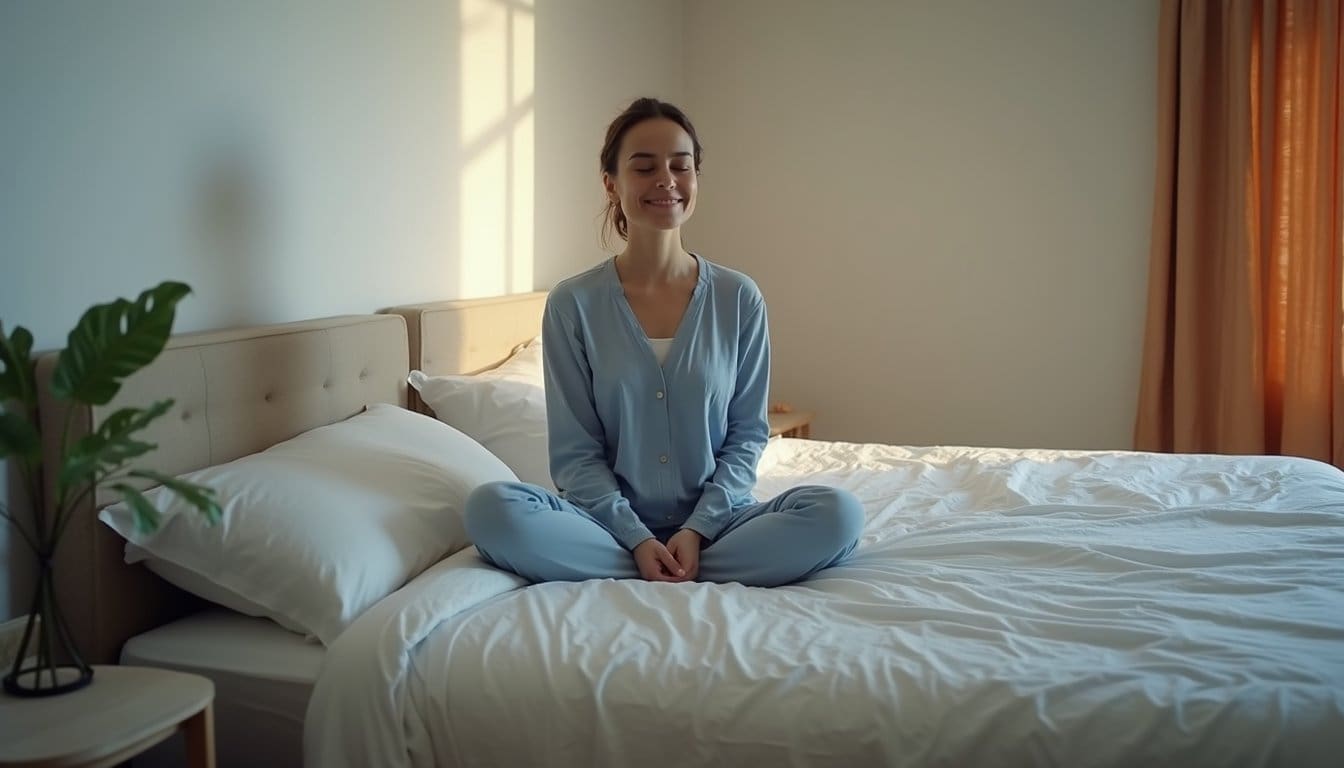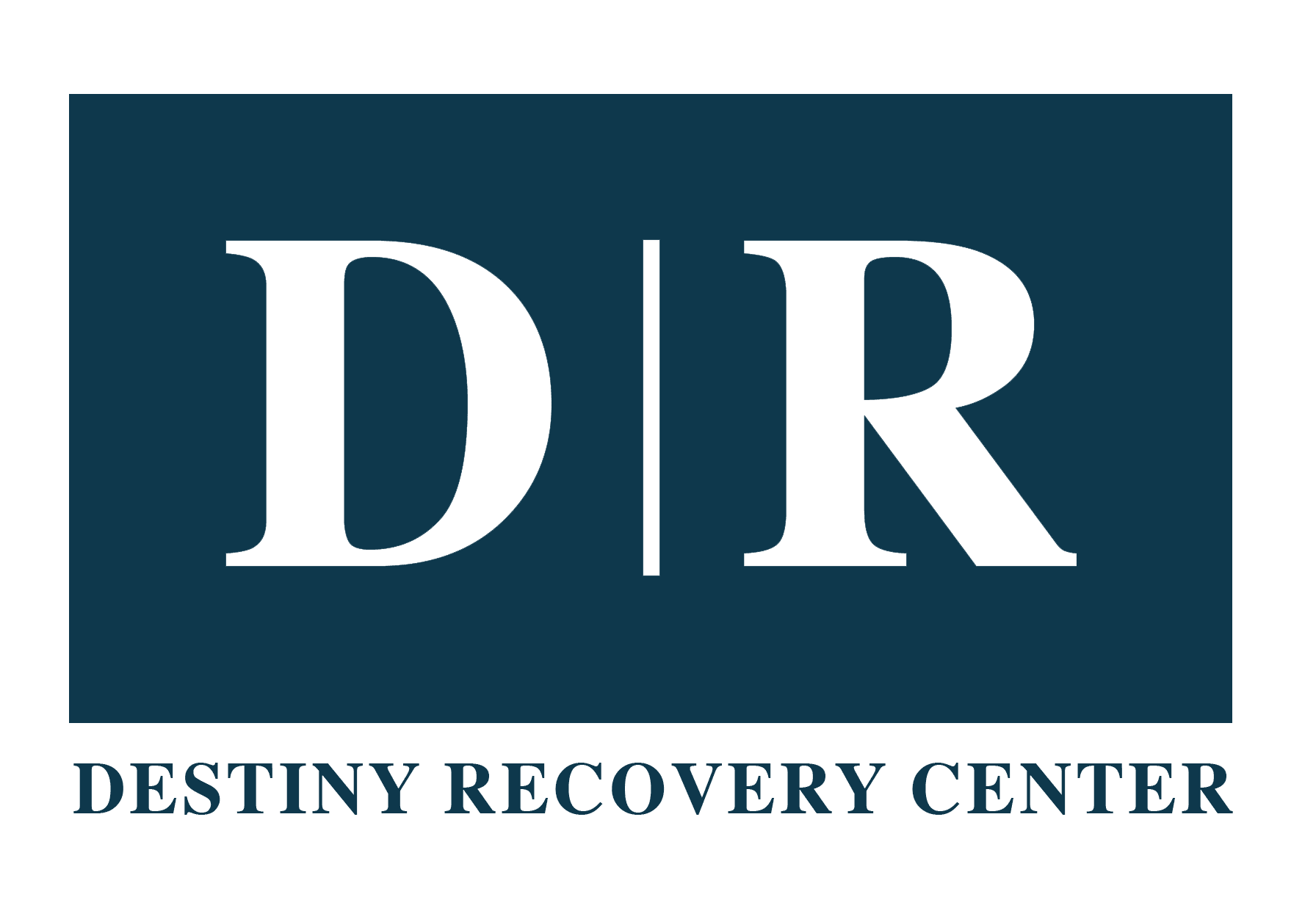Start with 5-10 minutes of breath awareness meditation before bed; it’ll activate your parasympathetic nervous system and lower the stress that’s sabotaging your sleep. Choose techniques that match your preferences: body scan meditation to release physical tension, loving-kindness meditation to quiet shame-fueled rumination, or box breathing to calm racing thoughts. When you combine these practices with your existing recovery treatments, research shows you’ll experience 43 minutes less wake time and markedly reduced cravings. Below, you’ll discover the neuroscience behind why this works and how to build a sustainable practice.
Why Sleep Problems Persist During Addiction Recovery and How Meditation Helps

When you’re working hard to maintain your recovery, persistent sleep problems can feel like an unfair burden, and the statistics confirm just how common this struggle really is. Between 25% and 96% of people in recovery experience sleep disturbances that extend months or even years beyond withdrawal. This happens because substances fundamentally alter your brain’s sleep architecture and circadian rhythms, changes that medication-assisted therapies often fail to restore.
Persistent sleep disruption doesn’t just leave you tired; it amplifies stress, weakens emotional resilience, and intensifies cravings. When you factor in comorbid mental health issues like anxiety and mood instability, sleep impairment becomes even more complex. Research shows that increased sleep latency and REM sleep disturbances are particularly predictive of relapse across multiple substance types. Studies have found that 46% of substance abusers actually use drugs or alcohol specifically to self-medicate their sleep problems, creating a devastating cycle. Here’s where meditation offers genuine hope: it addresses the neurobiological and psychological roots of sleep dysfunction without introducing new substances into your recovery journey.
Proven Meditation Techniques That Improve Sleep Quality in Recovery
While sleep medications may seem like the obvious solution, meditation offers a more sustainable path to restorative rest during recovery, one that strengthens your brain’s natural sleep mechanisms rather than introducing new dependencies. Research shows that meditation adherence dramatically improves sleep efficiency in people recovering from addiction.
Four evidence-based techniques that deliver measurable results:
- Mindfulness meditation reduces substance cravings and relapse rates while activating your prefrontal cortex for better impulse control
- Body scan meditation increases awareness of physical tension that disrupts sleep, helping you recognize stress signals earlier
- Loving-kindness meditation counteracts guilt and shame that fuel nighttime rumination, promoting emotional healing
- Breath awareness meditation activates your parasympathetic nervous system, lowering stress hormones that prevent restful sleep
Each technique addresses specific recovery challenges while building sustainable sleep patterns. These practices also deliver physical health improvements, including reduced blood pressure and boosted immune function that support overall recovery. For those new to meditation, even 5-10 minutes focusing on the breath before bed can provide meaningful benefits without requiring extensive time commitment.
The Science Behind Meditation’s Impact on Sleep and Relapse Prevention

Understanding what happens in your brain during meditation reveals why it’s so effective for both sleep and recovery. Meditation-induced neuroplasticity strengthens your prefrontal cortex and insula, enhancing emotional regulation and self-control, critical abilities when facing cravings or sleep disturbances.
Mindfulness-based sleep interventions produce measurable results. Research shows effect sizes of 0.89 compared to standard sleep education, with participants reducing Pittsburgh Sleep Quality Index scores from 10.2 to 7.4 after six weeks. Your thalamocortical pathways undergo structural changes that directly improve sleep architecture.
You’ll also experience restored HPA axis function, which normalizes your disrupted circadian rhythms from substance use. By reducing inflammatory signaling and dampening physiological arousal, meditation addresses the biological roots of both poor sleep and relapse vulnerability, creating lasting neurological changes that support your recovery. Studies with clinically significant sleep disturbance demonstrate that mindfulness meditation targets multiple cognitive and emotional processes that contribute to poor sleep quality, making it particularly valuable for those managing both addiction and sleep issues. The practice also lowers cortisol levels, which directly impacts your ability to fall asleep and maintain healthy sleep cycles throughout the night. When practiced consistently, attentional awareness helps you focus on present feelings and thoughts without judgment, allowing you to recognize sleep-disrupting anxieties before they escalate.
Combining Meditation With Traditional Recovery Treatments for Better Results
Meditation doesn’t replace your existing recovery program; it amplifies it. Research shows meditation‘s synergistic effects create outcomes you can’t achieve with either approach alone. When you add mindfulness to traditional treatment, you’re engaging complementary mechanisms that target sleep and recovery from multiple angles.
Integration creates measurable advantages:
- 50% remission rates for insomnia at 6 months when mindfulness combines with behavioral therapy, significantly higher than single approaches
- 43.75 minutes less wake time compared to 1.09 minutes in the control groups, demonstrating superior sleep consolidation
- Effect sizes up to 0.89 for reducing depression and fatigue, matching pharmacotherapy’s effectiveness without medication risks
- Sustained improvements that strengthen over time, with follow-up effects (0.54) exceeding initial gains (0.33)
Meditation triggers a physical relaxation response that calms breathing, reduces heart rate and blood pressure, and slows brain waves, directly counteracting the physiological stress that disrupts sleep during recovery.
You’re not choosing between treatments, you’re strategically stacking them for maximum impact.
Step-by-Step Guide to Starting a Sleep-Focused Meditation Practice

Starting a sleep meditation practice requires less complexity than you might expect, just five deliberate steps that transform your bedroom into a recovery-supporting sanctuary.
First, establish consistent practice habits by choosing a fixed nightly time. Prepare your environment: dim lights, adjust temperature to 60–67°F, and silence electronics one hour beforehand. Next, select a technique matching your individual technique preferences, body scan, progressive muscle relaxation, or breath-focused meditation all effectively reduce anxiety.
| Step | Action |
|---|---|
| 1 | Set fixed bedtime routine |
| 2 | Optimize sleep environment |
| 3 | Choose meditation technique |
| 4 | Start with 2–5 minute sessions |
Begin with brief sessions, gradually extending as comfort grows. Track your sleep quality through journaling, adjusting techniques based on your response. Research shows 2–4 weeks of practice yields measurable improvements in sleep efficiency. Practice box breathing by inhaling for four counts, holding for four, exhaling for four, and pausing for four to alleviate anxiety before sleep. Maintain a regular daytime mindfulness meditation practice to strengthen your ability to quiet the brain when preparing for sleep at night. Consider incorporating relaxing music or sounds to further enhance your meditation experience and deepen relaxation.
Frequently Asked Questions
Can Meditation Replace Sleep Medication During Early Recovery From Substance Abuse?
Meditation can’t fully replace sleep medication during early recovery, but it’s a powerful complement. While it improves cognitive processing and addresses underlying causes of insomnia like stress and anxiety, severe withdrawal symptoms often need medical supervision. You’ll get the best results combining meditation with your prescribed treatment plan. Don’t discontinue sleep aids without consulting your healthcare provider; they’ll help you develop an individualized approach that safely integrates meditation while managing your acute sleep disturbances.
How Long Before Sleep Improvements Appear After Starting Meditation Practice?
You’ll likely notice initial sleep improvements within 2-4 weeks of consistent meditation practice, with easier sleep onset and fewer nighttime awakenings. Enhanced sleep quality becomes more apparent after 1-3 months as your nervous system calms and stress regulation improves. For improved sleep duration and lasting benefits, especially if you’ve experienced severe substance-induced disturbances, commit to 3-6 months of daily practice. Your consistency matters most; pairing meditation with good sleep hygiene accelerates results markedly.
Is Meditation Safe for People With Trauma or Severe Mental Illness?
Meditation can benefit trauma and mental illness, but you’ll need caution. While it supports self-awareness development and reduces PTSD symptoms, about 8-30% experience adverse effects like anxiety or intrusive memories. You’re at higher risk if you’ve recent distress or attend intensive retreats. Work with a mental health professional who can tailor practices safely, monitor for harm, and help you avoid triggering spiritual awakening experiences that might overwhelm your healing process.
What if Meditation Increases Anxiety or Makes Racing Thoughts Worse?
If meditation increases your anxiety or racing thoughts, you’re not alone, about 30% of people experience this due to increased stimulation and unfamiliar sensations. Try shorter, guided sessions instead of lengthy practices, and pause if distress worsens. Work with a trauma-informed therapist to customize your approach, focusing on grounding techniques rather than intense awareness. Gradual progression with professional support helps your nervous system adjust safely, preventing overwhelm while building your meditation tolerance over time.
Can Meditation Help With Nightmares Common in Addiction Recovery?
Yes, meditation can notably help with nightmares during recovery. It strengthens your brain’s ability to regulate stress and anxiety, common meditation triggers for nightmares. Through mindfulness practices, you’ll develop better emotional processing skills, reducing the intensity of distressing dreams. Research shows meditation also increases lucid dreaming, giving you more awareness during nightmares. By breaking the anxiety-nightmare cycle, you’ll experience calmer sleep and stronger recovery. Start with just 5-10 minutes daily for best results.







